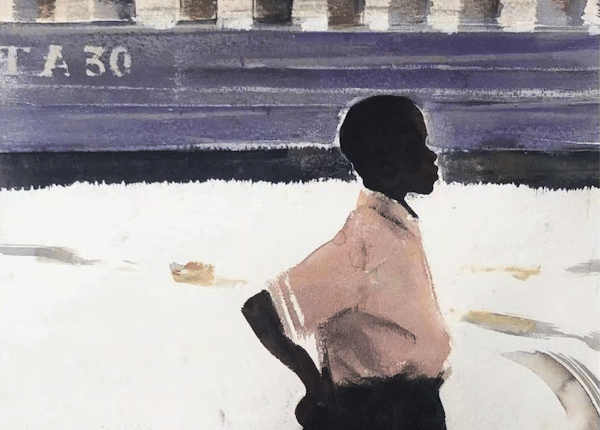Dear friends,
Greetings from the desk of Tricontinental: Institute for Social Research.
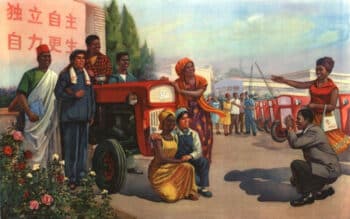
Guo Hongwu (China), 革命友谊深如海 (‘Revolutionary Friendship Is as Deep as the Ocean’), 1975.
In his 1963 book, Africa Must Unite, Kwame Nkrumah, Ghana’s first president, wrote, ‘We have here, in Africa, everything necessary to become a powerful, modern, industrialised continent. United Nations investigators have recently shown that Africa, far from having inadequate resources, is probably better equipped for industrialisation than almost any other region in the world’. Here, Nkrumah was referring to the Special Study on Economic Conditions and Development, Non-Self-Governing Territories (United Nations, 1958), which detailed the continent’s immense natural resources. ‘The true explanation for the slowness of industrial development in Africa’, Nkrumah wrote, ‘lies in the policies of the colonial period. Practically all our natural resources, not to mention trade, shipping, banking, building, and so on, fell into, and have remained in, the hands of foreigners seeking to enrich alien investors, and to hold back local economic initiative’. Nkrumah further expanded upon this view in his remarkable book, Neo-Colonialism: the Last Stage of Imperialism (1965).
As the leader of Ghana’s government, Nkrumah devised a policy to reverse this trend by promoting public education (with an emphasis on science and technology), building a robust public sector to provide his country with infrastructure (including electricity, roads, and railways), and developing an industrial sector that would add value to the raw materials that had previously been exported at meagre prices. However, such a project would fail if it were only tried in one country. That is why Nkrumah was a great champion of African unity, articulated at length in his book Africa Must Unite (1963). It was because of his determination that African countries formed the Organisation of African Unity (OAU) the same year as his book was published. In 1999, the OAU became the African Union.
As Ghana and Africa made small strides to establish national and continental sovereignty, some people had other ideas. Nkrumah was removed from office in a Western-backed coup in 1966, five years after Patrice Lumumba was ejected as prime minister of the Democratic Republic of the Congo and then assassinated. Anyone who wanted to build a project for the sovereignty of the continent and the dignity of the African people would find themselves either deposed, dead, or both.
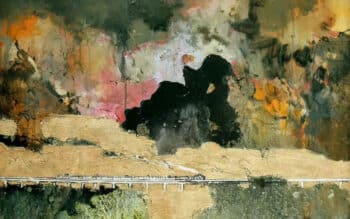
Pan Jianglong (China), 撒哈拉以东 (‘To the East of the Sahara’), 2017.
The Western-backed governments that followed these coups often reversed the policies to exercise national sovereignty and build continental unity. For instance, in 1966, the military leaders of Ghana’s National Liberation Council began to gut the policy of establishing quality public education and an efficient public sector with industrialisation and continental trade at its centre. Import-substitution policies that had been important to the new Third World states were rejected in favour of exporting cheapened raw materials and importing expensive finished products. The spiral of debt and dependency wracked the continent. This situation was worsened by the International Monetary Fund’s Structural Adjustment Programmes, set in motion during the worst of the 1980s debt crisis. A 2009 research paper from the South Centre noted that ‘the continent is the least industrialised region of the world, while the share of sub-Saharan Africa in global manufacturing value added actually declined in most sectors between 1990 and 2000’. Indeed, the South Centre paper referred to the situation in Africa as one of ‘de-industrialisation’.
In April 1980, African leaders gathered in Lagos, Nigeria, under the aegis of the OAU to deliberate about the harsh climate created by the IMF’s Structural Adjustment Programmes, which targeted their fiscal policies but did nothing to change the adverse international credit markets. Out of this meeting came the Lagos Plan of Action (1980—2000), whose main argument was for African states to establish their sovereignty from international capital and to build industrial policies for their countries and for the continent. This was, in essence, a renewal of the Nkrumah policy of the 1960s. Alongside the Lagos Plan of Action, the United Nations established the Industrial Development Decade for Africa (1980—1990). Towards the end of that decade, in 1989 the OAU—cognisant of the policy’s failure due to the deepening of neoliberal approaches that slashed budgets and intensified the export-oriented theft of African resources—worked with the United Nations to establish 20 November as Africa Industrialization Day. The failure of the Industrial Development Decade for Africa was followed by a second decade (1993—2002) and then a third (2016—2025). In January 2015, the African Union adopted Agenda 2063 to combine the imperative of industrialisation with Africa’s commitment to the Sustainable Development Goals. These ‘decades’ and Agenda 2063 have become merely symbolic. There is no agenda to undo external debt and debt servicing burdens nor any policy to create a climate to advance industrial development or finance the provision of basic needs.
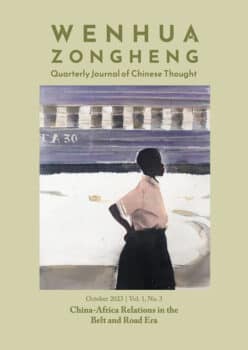 At the China-Africa Leaders’ Dialogue, held on the side-lines of the fifteenth BRICS (Brazil-Russia-India-China-South Africa) summit in Johannesburg, China launched the Initiative on Supporting Africa’s Industrialization ‘to support Africa in growing its manufacturing sector and realising industrialisation and economic diversification’. The Chinese government pledged to increase its funding to build infrastructure, design and create industrial parks, and assist African governments and firms in developing their industrial policies and industries. This new initiative will build off of China’s commitments at the 2018 Beijing Summit of the Forum on China-Africa Cooperation to strengthen infrastructure on the continent, share its own experiences with industrialisation, and support a development project that emerges out of the African experience rather than one forced upon African states by the IMF or other agencies.
At the China-Africa Leaders’ Dialogue, held on the side-lines of the fifteenth BRICS (Brazil-Russia-India-China-South Africa) summit in Johannesburg, China launched the Initiative on Supporting Africa’s Industrialization ‘to support Africa in growing its manufacturing sector and realising industrialisation and economic diversification’. The Chinese government pledged to increase its funding to build infrastructure, design and create industrial parks, and assist African governments and firms in developing their industrial policies and industries. This new initiative will build off of China’s commitments at the 2018 Beijing Summit of the Forum on China-Africa Cooperation to strengthen infrastructure on the continent, share its own experiences with industrialisation, and support a development project that emerges out of the African experience rather than one forced upon African states by the IMF or other agencies.
This week, Tricontinental: Institute for Social Research and Dongsheng launched the third issue of the international edition of the journal Wenhua Zongheng (文化纵横), entitled ‘China-Africa Relations in the Belt and Road Era’. This issue features three articles, written by Grieve Chelwa, Zhou Jinyan, and Tang Xiaoyang. Professor Zhou, concurring with the South Centre report, notes that ‘African countries were essentially de-industrialised’ since the 1980s and that whatever growth African countries experienced was a consequence of high commodity prices for exported raw materials. She points out that Western countries—offering debt, aid, and structural adjustment—are ‘not motivated to promote African industrialisation’. Drawing heavily from the UN Economic Commission for Africa and analysing the industrial policies of most African countries, Professor Zhou highlights four important points: first, the state must play an active role in any industrial development; second, industrialisation must take place on a regional and continental level—not within African states alone, given that 86 percent of Africa’s total trade is ‘still conducted with other regions of the world, not within the continent; third, urbanisation and industrialisation must be coordinated so that cities on the continent do not continue to grow into large slums filled with jobless youth; and fourth, manufacturing will be the engine of African economic development rather than the fantasy of service sector-led growth.
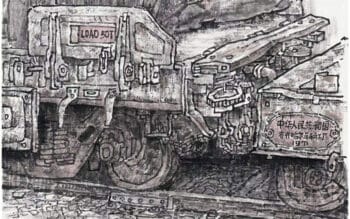
Zhao Jianqi (China), 回望故乡 (‘Longing for Home’), n.d.
These points guide Professor Zhou’s assessment of how China can support the process of African industrialisation. In sharing its experiences with African countries, she notes that ‘China’s failures’ are as important as its successes.
In his essay, Professor Tang tracks the record of the Chinese-led Belt and Road Initiative (BRI) on the continent. Established in 2013, the BRI is only a decade old, which barely allows enough time to fully assess this massive, global infrastructural and industrial development project. At the second Belt and Road Forum for International Cooperation (April 2019), UN Secretary-General António Guterres said, ‘With the scale of its planned investments, [the BRI] offers a meaningful opportunity to contribute to the creation of a more equitable, prosperous world for all, and to reversing the negative impact of climate change’. In 2022, the UN released a report on the role of the BRI called Partnering for a Brighter Shared Future, which noted that the BRI—unlike most other development projects—provided significant funding for infrastructure projects that may form the basis for industrialisation in regions that had previously been exporters of raw materials and importers of manufactured products.
Building on such assessments of the BRI, Professor Tang offers three practical ways in which the BRI has promoted industrialisation on the African continent: first, by constructing industrial parks with integrated power sources and creating industrial clusters of interconnected firms; second, by building industries to supply infrastructural materials; and third, by prioritising production for local markets rather than for export. Unlike the IMF policies that are forced on African countries, Professor Tang argues that ‘China encourages each country to follow its own path of development and to not blindly follow any model’.
Neither Tang nor Zhou nor Chelwa indicate that China is somehow the saviour of Africa. Those days are gone. No country or continent seeks its salvation elsewhere. Africa’s path will be built by Africans. Nonetheless, given its own experiences of building manufacturing against a structure that reproduces dependency, China has a lot to share. Since it has enormous financial reserves and does not impose Western-styled conditionality, China can, of course, be a source of financing for alternative development projects.
In December 2022, African Development Bank President Akinwumi Adesina said that ‘Africa’s prosperity must no longer depend on exports of raw materials but on value-added finished products’. ‘Across Africa’, he continued, ‘we need to turn cocoa beans into chocolate, cotton into textiles and garments, coffee beans into brewed coffee’. To keep in step with the times, we might add that Africa must also turn cobalt and nickel into lithium-ion batteries and electric cars and turn copper and silver into smartphones. Inside Adesina’s statement is Nkrumah’s dream: as he wrote in 1963, we have here, in Africa, everything necessary to become a powerful, modern, industrialised continent.
Warmly,
Vijay

